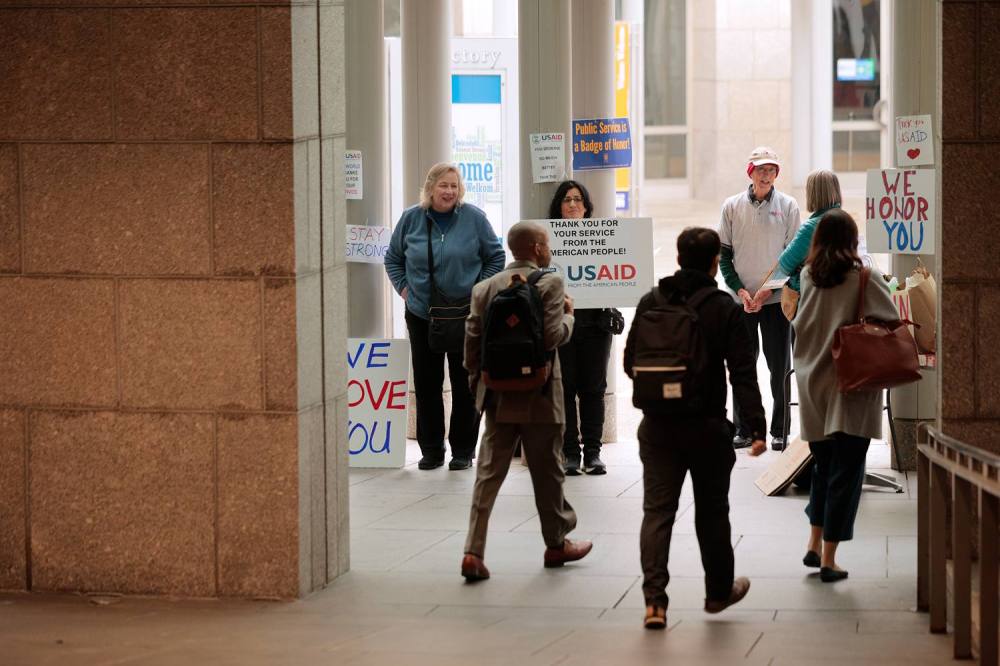Copyright Foreign Policy

It’s been more than eight months since U.S. President Donald Trump shocked the world by halting virtually all U.S. foreign aid, terminating billions in congressionally directed funding, and unilaterally dismantling multiple development offices in charge of overseeing the spending. Last week, the mood among the hundreds of attendees at the InterAction Forum—one of the largest annual gatherings of foreign aid workers—alternated between gallows humor, indignation, defiance, grim resolve, and cautious hope as humanitarian and international development professionals debated the best course of action for dealing with Trump 2.0 and the administration’s apparent disdain for their field. “This kind of breach of trust is not the way a normal government behaves,” said Elisha Dunn-Georgiou while accepting a leadership award on behalf of the Global Health Council, a nongovernmental organization she heads that advocates on public health issues. The organization is leading a major lawsuit that challenges the Trump administration’s sweeping cuts, arguing that the U.S. government should be required to pay foreign aid contractors for work that was contractually agreed to during the Biden administration. In pushing back against the Trump administration’s efforts to defund and undermine U.S. public support for foreign assistance, Dunn-Georgiou said it was important for aid groups to “infuse” compassion into their arguments about the importance of maintaining the United States’ traditional role as a major aid provider, while also recognizing that “protecting the [aid] systems doesn’t mean that we don’t think things need to be changed.” Trump has already terminated nearly $13 billion in foreign aid spending. In July, Congress, with only Republican votes, approved his request to terminate almost $8 billion in international assistance. In late September, the Supreme Court ruled that Trump could unilaterally rescind a further $4.9 billion via a legally controversial maneuver known as a pocket rescission, which sidesteps a law that requires congressional approval for any executive branch proposal to cancel federal spending. Meanwhile, billions more are still frozen by the Trump administration, and it remains unclear whether the funding will be released to be spent as Congress originally intended or if the administration will propose further rescissions or redirect it to different purposes. Against this backdrop, some speakers at the InterAction conference urged attendees to pursue a pragmatic approach when dealing with the Trump administration. This includes seriously considering long-standing conservative arguments that U.S. policy toward international development has encouraged a culture of aid dependency in some developing countries. Eddy Acevedo, who held senior roles at the now-shuttered U.S. Agency for International Development (USAID) during Trump’s first term, said during a panel discussion that aid organizations were too ready to forget the lessons they learned from Trump 1.0 under then-USAID administrator Mark Green and that programs should be focused on building self-reliance among aid recipients so that U.S. assistance could eventually be phased out. Under the Biden administration, there was less emphasis on weaning developing countries off U.S. support, particularly as the number of global humanitarian crises and the amount of aid spending increased. Then-USAID chief Samantha Power led an effort to encourage more localization of U.S. foreign aid spending, with the goal of building up local capacity and reducing aid dependency by increasing the amount of funding that went directly to local nonprofits, companies, and governments. But USAID’s well-meaning long-term goals were repeatedly overtaken during U.S. President Joe Biden’s term by the urgency of multiple humanitarian crises in places such as Ethiopia, Sudan, and Gaza. In the end, Power’s localization initiative produced incremental results. From 2021 to 2024, USAID increased the amount of humanitarian and development aid it provided to local organizations from 8.8 percent to 12.1 percent, according to a 2024 progress report. “During Biden years, NGOs did a memory dump and treated the first Trump administration as a memory blip,” Acevedo said. “To me, the failure happened during the Biden administration when it comes to neglecting and talking to Republicans. I think for the future, this is a mistake that we should not make again.” Acevedo echoed conservative criticisms that during Biden’s term, U.S. foreign aid became overly focused on pet progressive causes such as advancing global LGBTQ rights and helping developing countries adapt to climate change. In doing so, Acevedo argued, the Biden administration harmed the bipartisan congressional support that has been essential for protecting foreign aid spending, which traditionally comprises roughly 1 percent of the federal budget. However, some of USAID’s defenders have argued that those kinds of conservative talking points gloss over the reality that the aid office’s budget was more heavily obligated than any other U.S. agency, with more than 90 percent of it earmarked by Congress at the end of the Biden administration to be spent in certain countries and for specific purposes. Additionally, any time that USAID wanted to obligate funding, it had to first notify four separate congressional oversight committees. The party leaders from any of those committees had the ability to place holds on the proposed spending, pauses that historically were used to negotiate changes to the proposal or to horse-trade on other, sometimes unrelated, policy matters. “There is basically no discretion there. … There is no other agency that has this,” said a former senior USAID official during the Biden administration, who requested anonymity to speak candidly about the current and former administrations. “Every obligation that USAID makes requires a congressional notification.” The former official said that it was disingenuous for Republicans to criticize Biden and Power for spending on progressive causes that amounted to a “tiny percentage” of the USAID budget and that Republican congressional overseers signed off on, first when the funds were earmarked and then again when the funds were disbursed. Still, Acevedo urged for more deliberate outreach to Capitol Hill, with a focus on the staffers of recently elected Republican lawmakers. “We should talk to both parties all of the time and don’t take that support for granted,” he said. “One of the things we’ve realized over the years is there has been such a fast turnover … of staff and lawmakers that half of them don’t even know what we’re talking about.” While there were many nods of assent from audience members at this advice, which was repeated throughout the conference, some attendees pushed back, arguing that it presupposed a level of normalcy and respect for rule of law and constitutional norms that has been absent from the second Trump administration. They pointed to the White House’s unilateral shuttering of USAID, which ignored statutes that require congressional authorization for such a move, and its continued withholding of so much foreign aid, which Democratic critics and Congress’s own watchdog have argued is an illegal impoundment. “As a small-business owner, I’m not concerned about rule of law in other countries, I’m concerned about rule of law in this country because I can’t run a business without predictability,” said one of the attendees, who runs a small foreign aid organization and requested anonymity due to fear of penalization by the Trump administration for publicly criticizing its withholding of congressionally directed foreign aid spending. That audience remark was met with strong applause from other attendees, a handful of whom approached the aid contractor afterward to say that they were glad someone had said what they were also thinking. No one in this group was prepared to go on the record either, due to similar fears of being blacklisted by the Trump administration. Nevertheless, the former Biden USAID official said that they hoped pragmatism would win the day and that development professionals would be able to find common cause where possible with the Trump administration. “I would look for areas of convergence in Gaza or Syria, clearly in areas where the administration has priorities … competing with China or finding ways to strengthen supply chains for critical minerals, all of that is development work.”



